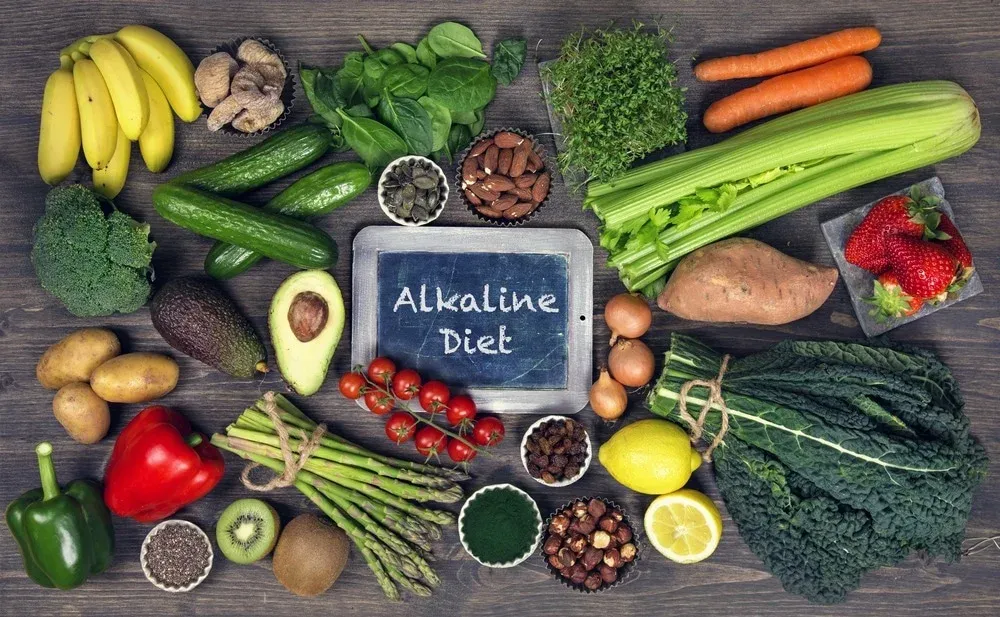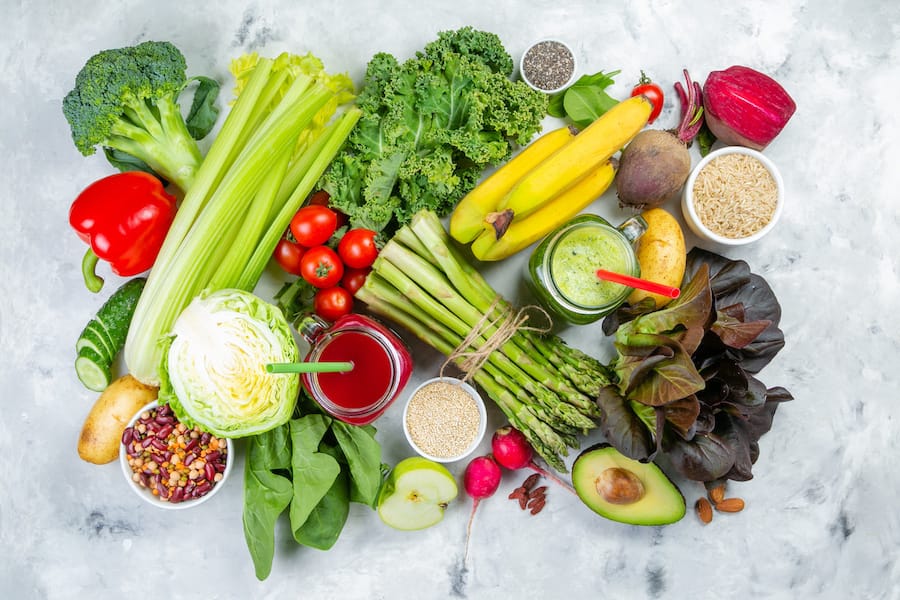What to Eat or Not to Prevent Acidity Problems? Explore the Best Alkaline Diet Options!
Navigating acidity issues: Discover the dos and don'ts of your diet to prevent acidity problems. Explore alkaline-rich foods, fibre-packed choices, and smart eating habits while steering clear of triggers that may exacerbate acidity. 🍏🥑

Foods Not to Eat:
- Citrus Fruits: Oranges, limes, and grapefruits are highly acidic
- Tomatoes: Tomatoes and tomato-based products like sauces and ketchup
- Spicy Foods: Hot peppers, curry, and other spicy dishes
- Coffee and Tea: Caffeinated beverages
- Chocolate
- Carbonated Drinks: Sodas and other carbonated beverages.
- Fried and Fatty Foods: High-fat foods like fried chicken, French fries, and fatty cuts of meat
- Onions and Garlic: Raw onions and garlic
- Mint: Excessive consumption of minty foods or drinks
- Alcohol: Excessive alcohol consumption
Foods To Eat:
- Oatmeal: Oatmeal is a low-acid food
- Bananas: Bananas are alkaline in nature.
- Ginger: Ginger has anti-inflammatory properties
- Melons: Melons like honeydew and cantaloupe are alkaline fruits
- Leafy Greens: Leafy green vegetables like spinach, kale, and lettuce are alkaline
- Non-citrus Fruits: Fruits like apples, pears, and berries are less acidic
- Almonds: Almonds are alkaline nuts
- Yogurt: Plain yogurt
- Whole Grains: Whole grains like brown rice, quinoa, and barley are low-acid foods
- Green Vegetables: Green vegetables like broccoli, green beans, and asparagus are alkaline
Dealing with acidity can be a daily struggle for many, impacting not only our digestive health but overall well-being. The good news is that what we eat plays a crucial role in preventing acidity problems. Earlier we shared the list of foods to eat or not in acidity problems and further, we'll explore what to do and what to eat in detail. Delve into the do's and don'ts of creating an acidity-friendly diet that promotes digestive harmony.
Understanding Acidity
Acidity is a prevalent issue that stems from the overproduction of stomach acid, causing discomfort and potential health concerns. In the context of digestion, acidity refers to the increased acidic content in the stomach, leading to symptoms like heartburn and indigestion.
Causes of Acidity:
Understanding the triggers of acidity is crucial. Factors such as stress, irregular eating habits, and certain types of food can contribute to heightened acid production. Stress, for instance, stimulates the release of certain hormones that can prompt the stomach to generate more acid than necessary.
Impact on Health:
If left unmanaged, acidity can have broader implications on health. Chronic acidity may lead to conditions like gastroesophageal reflux disease (GERD), erosive esophagitis, or even ulcers. Recognizing the signs and addressing acidity promptly is essential for long-term well-being.
Foods to Avoid
Certain foods are notorious for exacerbating acidity and being mindful of these can significantly aid in prevention.

High-Acidic Foods:
Foods with high acidity levels, such as citrus fruits (lemons, oranges), tomatoes, and vinegar, can intensify acid production in the stomach. While these foods offer various health benefits, consuming them in moderation can help prevent acidity issues.
Citrus Magic:
While lemons and limes are acidic in nature, they have an interesting alkalizing effect on the body once metabolised. This phenomenon is due to the presence of minerals like potassium.
Tomato Transformation:
The acidity of tomatoes can vary based on factors like ripeness and variety. Interestingly, cooking tomatoes can reduce their acidity, making them more tolerable for individuals prone to acidity problems.
Vinegar Versatility:
Vinegar, a common acidic ingredient, has been used for centuries not only in culinary applications but also for its potential health benefits, including aiding digestion and acting as a natural preservative.
Spicy and Oily Foods:
Spices and oils can be delightful in meals, but excessive consumption can be a trigger for acidity. Spicy foods, particularly, may irritate the stomach lining and lead to increased acid secretion. Fried and oily foods can slow down digestion, further contributing to acidity problems.
Carbonated Beverages:
Carbonated drinks, including sodas and fizzy beverages, introduce carbon dioxide to the stomach, leading to increased pressure and potentially causing acid reflux. Limiting the intake of such drinks is advisable for those prone to acidity.
Coffee and Chocolate:
While beloved by many, both coffee and chocolate can be culprits in triggering acidity. Caffeine in coffee stimulates acid production, and chocolate contains compounds that may relax the lower oesophagal sphincter, promoting acid reflux.
Alcohol:
Excessive alcohol consumption can irritate the stomach lining, leading to increased acid production. Moderation is key, and those prone to acidity may consider limiting alcohol intake.
By being conscious of these food and drinks choices, individuals can take proactive steps towards preventing acidity problems and promoting better digestive health.
Acidity-Friendly Diet
Adopting an acidity-friendly diet is a proactive approach to managing digestive health. It involves making conscious choices about the foods we consume to promote a balanced pH level in the stomach, mitigating the risk of acidity-related issues.

Alkaline-Rich Foods:
Incorporating alkaline-rich foods into the diet helps neutralize excess stomach acid. Bananas, melons, and leafy greens are excellent choices. These fruits and vegetables not only provide essential nutrients but also contribute to maintaining a more alkaline environment in the stomach.
Hydration:
Proper hydration is a fundamental aspect of an acidity-friendly diet. Water helps flush out toxins from the body and aids in the digestion process. Drinking an adequate amount of water throughout the day supports overall digestive health and reduces the risk of acidity.
Balancing pH Levels
Achieving a balance in pH levels is pivotal for preventing acidity-related discomfort. Here are some strategies to maintain optimal pH levels in the stomach.
pH Scale Insights:
The pH scale measures acidity and alkalinity. Foods with a pH below 7 are considered acidic, while those above 7 are alkaline. Some surprising acidic foods include lemons (pH 2-3) and tomatoes (pH 4-5).
Incorporating Fruits and Vegetables: A diet rich in fruits and vegetables provides essential vitamins, minerals, and antioxidants. These foods contribute to a more alkaline environment in the stomach, helping to counteract the effects of excess acid.
Role of Fiber in Digestion: Fiber plays a crucial role in digestion and can aid in balancing pH levels. Whole grains, legumes, and fibrous vegetables promote healthy digestion, preventing the accumulation of acid in the stomach.
Meal Timing and Portion Control:
Meal timing and portion control play crucial roles in maintaining a healthy digestive system and preventing acidity-related issues. Here's how you can optimise these aspects for better digestive well-being.
Importance of Regular Meals:
Establishing a regular eating schedule is essential for managing acidity. Irregular meals can disrupt the natural rhythm of the digestive system, leading to imbalances in stomach acid production. Aim for three main meals and healthy snacks in between to keep your digestive system in sync.
Avoiding Overeating:
Overindulging in large portions can put a strain on the digestive system, leading to increased stomach acid production and a higher risk of acid reflux. Practising portion control helps prevent excessive pressure on the stomach, promoting better digestion and reducing the likelihood of acidity.
Herbal Remedies
In addition to lifestyle and dietary changes, herbal remedies can provide natural relief from acidity and support overall digestive health.
Ginger Tea:
Ginger has long been praised for its digestive benefits. Ginger tea, in particular, can help soothe the stomach lining, reduce inflammation, and alleviate symptoms of acidity. Enjoying a cup of ginger tea after meals may contribute to a calmer digestive system.
Chamomile Tea:
Chamomile tea is known for its calming properties and can be effective in reducing acidity. It helps relax the muscles of the gastrointestinal tract, easing the discomfort associated with acid reflux. Sipping on chamomile tea before bedtime may aid in a more restful sleep.
Aloe Vera:
Aloe vera is not just for skincare; it also offers benefits for digestive health. Consuming aloe vera juice in moderation can have a soothing effect on the stomach lining, reducing irritation and promoting a more balanced pH level.
Peppermint:
Peppermint is known to relax the muscles of the gastrointestinal tract, which can help alleviate symptoms of acidity. Peppermint tea or diluted peppermint oil may be beneficial, but it's essential to use them in moderation to avoid potential side effects.
Incorporating these herbal remedies into your routine, alongside mindful meal timing and portion control, can contribute to a holistic approach to managing acidity. As always, it's advisable to consult with a healthcare professional, especially if you have pre-existing medical conditions or concerns.
Lifestyle Changes
Making positive lifestyle changes is instrumental in managing acidity and promoting overall digestive health. Here are some key adjustments you can incorporate into your daily routine for better well-being.
Stress Management:
Stress is a significant contributor to acidity problems. Engaging in stress-reducing activities such as yoga, meditation, or mindfulness exercises can help alleviate tension and positively impact digestive health. Prioritising self-care and finding healthy outlets for stress can contribute to a more balanced digestive system.
Avoiding Late-Night Meals:
Consuming large or heavy meals close to bedtime can lead to increased acid production during the night, contributing to acidity problems. Aim to finish your last meal at least two to three hours before bedtime, allowing the digestive system ample time to process food before sleep.
Personalized Diets
Creating a personalised diet tailored to individual needs is a powerful approach to preventing acidity problems. Here's how you can customise your diet for optimal digestive health.
Consulting with a Nutritionist: Seeking guidance from a nutritionist is the first step towards creating a personalised diet plan. A professional can assess your specific dietary requirements, health goals, and potential triggers for acidity. This personalised approach ensures that your diet aligns with your unique needs.
Identifying Trigger Foods: Through consultation and personal observation, identify specific foods that trigger acidity for you. Keeping a food diary can help track your diet and pinpoint items that may contribute to digestive discomfort. Eliminating or moderating these trigger foods is a key aspect of a personalised diet.
Yogurt and Probiotics
Incorporating yoghurt and probiotics into your diet is a beneficial strategy for promoting a healthy digestive system and preventing acidity.
Benefits of Probiotics:
Probiotics are beneficial bacteria that contribute to a balanced gut microbiome. They play a crucial role in maintaining digestive health and can help prevent acidity problems. Yoghurt, especially varieties that contain live cultures, is an excellent source of probiotics.
Including Yogurt in the Diet:
Yoghurt can be easily incorporated into your daily meals. Whether enjoyed on its own, added to smoothies, or used as a base for sauces and dressings, yoghurt provides a tasty and versatile way to introduce probiotics into your diet. Choose plain, unsweetened yoghurt for maximum benefits.
Other Probiotic Sources:
In addition to yoghurt, explore other sources of probiotics such as kefir, sauerkraut, kimchi, and fermented pickles. Diversifying your probiotic intake ensures a broader spectrum of beneficial bacteria for your gut.
Balancing Dairy Intake:
While yoghurt is a valuable source of probiotics, it's essential to consider individual tolerance to dairy. If lactose intolerance is a concern, opt for lactose-free or non-dairy alternatives like coconut or almond yoghurt.
Meal Preparation Tips
How you prepare your meals can significantly impact your digestive health and help prevent acidity problems. Consider the following meal preparation tips for a stomach-friendly approach.
Choosing Cooking Methods: Opt for cooking methods that are gentler on the stomach, such as steaming, grilling, or baking. These cooking methods retain nutrients while reducing the risk of irritating the digestive system. Avoid frying or deep-frying, as high-fat content can contribute to acidity.
Optimal Food Combinations: Pairing foods strategically can aid digestion and minimise the risk of acidity. For example, combining lean proteins with complex carbohydrates and various vegetables creates a balanced meal that is easier for the digestive system to process.
Physical Activity and Digestion
Incorporating regular physical activity into your routine contributes to overall well-being, including digestive health. Understand the connection between exercise and digestion for a holistic approach.
Promoting Movement after Meals:
Engaging in light physical activity, such as a short walk, after meals can aid digestion. Movement helps prevent the stagnation of food in the stomach, reducing the likelihood of acidity problems.
Exercise and Gut Motility:
Regular exercise has been linked to improved gut motility, which facilitates the movement of food through the digestive system. This can contribute to a smoother digestive process and reduce the risk of acidity.
Yoga for Digestive Health:
Specific yoga poses are designed to support digestion. Incorporating practices like gentle twists or a child's pose can help alleviate digestive discomfort and promote a healthy gut.
Conclusion
In conclusion, a mindful approach to diet and lifestyle is paramount in preventing acidity problems. By incorporating alkaline-rich foods, and herbal remedies, and adopting healthy habits, individuals can manage acidity effectively. Understanding personal triggers and making informed choices empower individuals to take charge of their digestive health.
FAQs
- Can stress really contribute to acidity problems?
- Yes, stress can stimulate excess stomach acid production, leading to acidity problems.
- How can I identify my personal triggers for acidity?
- Keeping a food diary helps in tracking and identifying specific foods that trigger acidity for individuals.
- Is it necessary to completely avoid spicy foods to prevent acidity?
- While moderation is key, completely avoiding spicy foods may not be necessary. It's about finding a balance that works for you.
- Can yoghurt alone prevent acidity problems?
- Yoghurt, especially with probiotics, contributes to digestive health, but it should be part of a holistic approach that includes a balanced diet.
- Are herbal remedies a substitute for medical advice in managing acidity?
- While herbal remedies can offer relief, consulting with a healthcare professional is crucial for a comprehensive approach to managing acidity.
- Is lemon causes or cure acidity?
- Lemon is often perceived as acidic due to its tart taste, but paradoxically, it can actually help to alleviate acidity within the body. When consumed, lemon juice can have an alkalizing effect on the body's pH levels. Despite containing citric acid, once metabolised, lemon juice produces alkaline by-products that can help to neutralise excessive acidity in the stomach and promote a more balanced pH environment. However, individual responses may vary, and it's essential to consult with a healthcare professional for personalised advice on managing acidity or any related health concerns.



